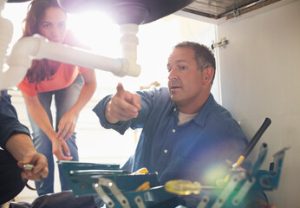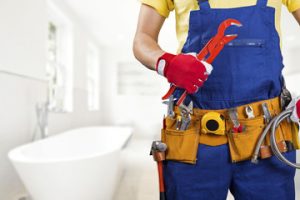Plumbers are responsible for the installation, repair and maintenance of pipes, fixtures and appliances like sinks, toilets, showers and water heaters. They work in residential, commercial and industrial settings.

Plumbers are in demand year-round due to the need for routine maintenance, emergency repairs (burst pipes, clogged drains) and new construction. The career can be rewarding and stable, with opportunities to expand skill sets through specialized work. Contact Plumber Westminster for professional help.
Plumbers install piping, fixtures, and appliances that facilitate the distribution of water, gas, and waste in residential and commercial settings. They work with blueprints to ensure that all components are connected correctly and meet local building codes. Plumbers also inspect plumbing systems to ensure they are functioning properly and safely.
One of the most important skills in this career is having good problem-solving abilities, as plumbing issues often arise unexpectedly. This means that a plumber must be able to identify and fix issues quickly. In addition, plumbers often deal with customers directly, so good customer service skills are essential for maintaining positive relationships.
Plumbers must be familiar with a wide range of plumbing issues, including leaky pipes, clogged toilets, and broken water heaters. They use tools such as augers, snakes, and hydro jets to unclog drains and sewer lines and may have to remove and replace damaged parts. Some plumbers also install and repair sprinkler systems.
New construction plumbers often specialize in rough-in plumbing, which is the first phase of installing a plumbing system in a new house or addition. During this process, plumbers connect piping to the main water supply valve and lay out drain lines and vent stacks before the walls are closed up. Plumbers then connect all of the fixture components, such as sinks and toilets, and test the system for leaks and proper water flow.
Experienced plumbers sometimes specialize in a particular area of plumbing, such as gas line installation and maintenance. This involves ensuring that all gas lines are properly installed and maintained, which can prevent dangerous accidents and fires. These professionals may also need to install kitchen appliances, such as stoves and dishwashers, as well as gas heating systems. Licensed plumbers are required to understand and comply with all state, provincial, and local regulations regarding the installation of these types of fixtures.
Maintenance
A plumber’s duties include installing, repairing and maintaining the piping, fixtures and appliances that provide water for drinking, bathing and cooking. They also ensure that all water and sewage systems are functioning properly and safely. This includes inspecting the sanitary sewer lines to identify problems such as cracks, tree root intrusion and clogs. Regular maintenance by a professional can prevent expensive plumbing repair bills and maintain the value of a home.
For commercial and industrial settings, plumbers install, maintain and repair large-scale piping and plumbing systems. They also work on complex equipment such as industrial water heaters, fire sprinklers and more. These professionals typically need to collaborate with architects, construction teams and building managers to ensure the plumbing system is integrated effectively into the overall infrastructure of the space.
Choosing the right plumber for routine maintenance and emergency repairs is vital. Look for a plumber who has experience working in the type of space you have, knows the local codes and can respond quickly to any issues that arise. It is also important to choose a plumber with the appropriate licensing and certification, especially for those who work on hazardous materials or in elevated or confined spaces.
Preventive plumbing maintenance is an investment that protects your property and keeps your family healthy. Your plumber will conduct a comprehensive inspection of your entire plumbing system, including the sewer line. They will check for leaks, water pressure and temperature fluctuations, as well as any other potential problems. Then, they will take steps to address any concerns before they become larger issues.
A plumbing system is a complex network of pipes, fixtures and appliances that connect all the water-related items in your house. These include toilets, faucets, sinks, bathtubs, showers, dishwashers and water heaters. Keeping up with preventive plumbing maintenance can help you avoid costly repairs and extend the life of your fixtures. Simple things like flushing sediment out of water heaters, fixing small drips promptly and ensuring your water pressure is correct can save you from expensive equipment replacement costs down the road. Plus, it helps to keep your household running smoothly and reduces the risk of water damage and mold.
Repair
Whether it’s due to age, wear and tear, or just everyday use, pipes can eventually get worn down or develop leaks. This is when you’ll need a plumber to come in and do some repairs. From fixing clogged drains to replacing water heaters, plumbers can help keep your home’s plumbing running smoothly.
While some people may believe that the plumbing repair process is complex and intimidating, it doesn’t have to be. When you hire a professional, they’ll be more than happy to walk you through each step and answer any questions you might have. It is a good idea to prepare yourself for the repair ahead of time by shutting off your water supply and placing a bucket under any leaking areas, just to avoid any accidents or additional damage.
Before beginning the actual repair, your plumber will assess the situation and determine the best course of action to take. They’ll then let you know what the repair will entail and give you an estimate of the cost. For example, if your sewer line has been damaged, they might recommend a pipe relining service, which is more affordable than replacing the entire line.
This method involves cutting a small hole in the affected area of your pipe, then inserting a flexible cloth pipe liner that’s imbued with a thick liquid resin. Once the liner is in place, it’s sealed on one end and attached to a specialized tool that’s pulled through your damaged pipe using a winch. The specialized tool pulls the new liner into place, where it’s inflated to fill the damaged section of pipe and create a strong, long-lasting repair.
Residential plumbing repair focuses on the systems typically found in homes and apartments, such as kitchens, bathrooms, laundry rooms, and standard water heaters. Commercial plumbing repair, on the other hand, deals with larger, more complicated systems that meet higher usage demands. CG Plumbing has experience working with both types of plumbing, and understands the unique challenges that each brings.
Troubleshooting
Whether they’re installing plumbing systems in homes or working on industrial equipment, plumbers often encounter problems that require troubleshooting. These problems can range from a minor clog or leak to a major burst pipe, and each one requires an understanding of how the problem developed to identify and resolve it.
For example, a leaky faucet may seem harmless, but it can add up to significant water bills and cause costly damage over time. It’s important for homeowners to learn how to troubleshoot these issues, which can save them money and keep their plumbing in good condition.
A skilled plumber can help determine the root of an issue, which in turn allows them to provide accurate quotes and repair services. Using tools like a digital multimeter, they can check for obvious problems and test components to identify the source of an issue. If there is more than one potential problem, they use the elimination process to isolate and test each one until they find the real culprit.
This approach also helps troubleshooters avoid costly mistakes by ensuring they’re not wasting time or resources on a non-existent problem. It’s also crucial to take notes and records of each troubleshooting session, which can be useful when the problem resurfaces or to track trends over time.
Many problems can be prevented with regular maintenance and prompt repairs. A CMMS such as MaintainX makes it easy for plumbers to create preventive maintenance work orders that can reduce the frequency of breakdowns and other problems.
A plumbing system is an indispensable part of our daily lives, but it’s easy to overlook its importance until something goes wrong. Having basic plumbing knowledge can save you the hassle of dealing with common issues like leaky faucets, running toilets, and clogged drains. It can also help you avoid more serious problems, such as sewage backups or gas line malfunctions. Remember to take proper safety precautions when handling plumbing problems, and always consult a professional for more complex issues or emergencies.

